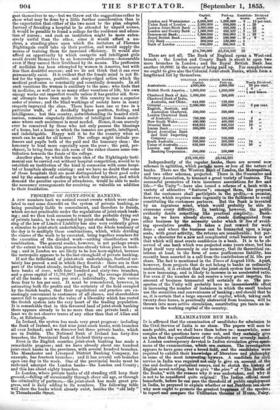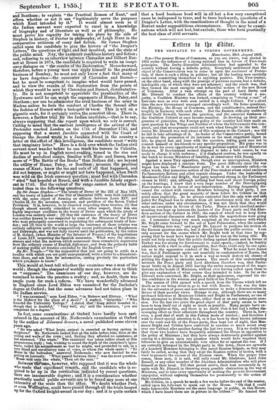EXAMINATION BUN MAD.
IT is affirmed that the examination of candidates for admission to the Civil Service of India is no sham. The papers will soon be made public, and we shall have them before us : meanwhile, some samples of the questions have come out, and they certainly give an idea that the qualifications of the students are severely tested. A London contemporary devoted. to Indian eiroulation grves,spici- mens of the examinations, which are curious. The investigation appears to have gone over a broad field, and the candidates were required to exhibit their knowledge of literature and philosoRby in some of the most interesting byways. A candidate for civil service in India was required not only to give an account of the rise and decline of periodical essays, and to sketch the. history of English novel-writing, but to give "the plan" of "The Battle of the Books," with the reasons why it was undertaken, and why it is not to be considered quite original! The Indian official must henceforth, before he can pass the threshold of public employment in India, be prepared to explain whether or net Bentham can show why men ought to promote the greatest happ*sa of the species; to report and compare the Utilitarian theories of Hower rail', and Bentham; to explain " the Practical Reason of Kant," and affirm whether or not it can "legitimately serve the purposes which Kant intended by it." It would almost seem as if the Indian servant were expected to excel in a knowledge of biography and of literature as well as of philosophy. He must prove his capacity for taking his place by the side of Stephen in history, of Ferrier in philosophy, of Leigh Hunt in the comparative criticism of essay and fiction. Sir James Stephen called upon the candidate to give the history of " the Draper's Letters," the questions of right, and faqcolved, and the state of the public mind. • Nay, the ex4iiiik 'blots history and fiction; and; referring to itix intervieW betvieen arendon and Gilbert Bur- netvat Rouen in 1674, the candidate is required to write an imagi- nary dialogue on "the results of the Ilastoration." Henceforward, therefore, before a yeiing maO ead'ikply. himself to the practical business of Bombay, he must not only know a fact that many of us have forgotten—the enconnteii of Clarendon and Burnet— but be must be competent, to imagine, what would have passed, and to view the results of the Restoration from the points at whicth.they would be seen by Clarendon and Burnet, distributative- ly. He is not -competent to appreciate the peculiarities of the Ryotwaree until he can weigh the arguments of Hume, Paley, and Bentham; or can his adramister the civil business of the army in Madras unless he feels the conduct of Charles the Second after the fashion of Burnett with a bishopric in view. This is wit on a gigantic scale, for it certainly unites the remotest ideas. There is, however, a 'farther trial for the Indian candidate,—that is to say, always supposing that the repart upon which we rely is correct. Calling to mind that the earliest. inWiligence of the arrival of the Pretender reached London on the 17th of -December 1745, and supposing that a secret Jacobite romected with the Court of G-eorge the, Second wrote to le -JacObltn friend in the country a letter on thCeffeot of ;this intelligence, the candidate must write that imaginary letter." Here is a field over whioh the Indian civil servant must wander before he can reach his bureau in Calcutta. He must be up in English novel-reading, Versed in the rise and decline of periodical essays, familiar with More • and Bacon, know more of " The Battle of the Books" than Boileau did ; see beyond, the utility of Hume, Paley, or Benthaut.; , measure the practical reason of Kant ; know the ins and outs of' all that happened, and did not happen, or might or might not htillappened, when Swift was wild on the Irish currency question ;tiliust feel with Clarendon " riled " but hopeful at Rouen, and 'with a Jacobite falsely expect- ant in 1745. But the extent of the range cannot be better • trated than in the following questions. By Sir James Stephen.—" The treaty of Dover of the 22d of May 1670, and the treaty of London of the 31st of December 1670, were both concluded with the same object of forming an alliance between Louis XIV. and. Charles II, for the invasion, conquest, and partition of the Seven United PrOvinces. It is, however, to be observed respecting these treaties, (1) that though almost exactly coincident in every other respect, there was one highly important condition in the treaty of Dover upon which the treaty of London was entirely silent ; (2) that the existence of the treaty of Dover was neither known to nor suspected by some of the Ministers of the Crown who were principally concerned in negotiating the subsequent treaty of Lon- don • and (3) that to the world at large the existence of those treaties was entirely unknown until the comparatively recent publications of Macpherson and Dalrymple, and was not fully known until the publication, by the orders of hi. Guizot, (when Minister of the Interior of France,) of the negotiations of Louis XIV. respecting the Spanish. succession. What were the cirdum- stances and what the motives which occasioned these remarkable departures from the ordinary course of English diplomacy, and from the prdinary habit of making public all treaties concluded by the English Crown ?" By if Tempe.—"On the supposition that you are going to settle in a locality with which you are quite unacquainted, write a letter to a friend resi- dent there' and ask him for information; stating precisely the particulars which you desire to know."
This would at least tell whether the examinee was a man of the world ; though the sharpest of worldly men are often slow to think on "supposes." The examiners of our day, however, are de- termined to make the practice a reality ; and, no doubt, there was ample room for such a reform. We have wonderfully advanced in England since Lord Eldon was examined for the Bachelor's degree at Oxford ; but the same advances had not taken place in the Indian service.
"I was examined," says Lord Eldon, "in Hebrew and History. What is the Hebrew for the place of a skull ?' I replied, Golgotha.' A Who founded the University College ?' I stated that 'King Alfred founded it ; though that is doubtful." Very well, sir,' said the examiner, you are competent for a degree.'" In fact, some examinations at Oxford have hardly been cari- catured in the account of Mr. Nethersole's examination at Oxford by the author of Edmund Somers, a novel published some eleven years ago. "He was asked What brute animal is recorded as having spoken in Scripture.?' Mr. Nethersole looked first at the table before him, then at the ceiling and walls of the room ; and, finding they afforded no assistance, at last answered, The whale.' The examitier was taken rather aback at this Preposterous reply ; but, wishing to sound the depth of the examinee'a igno- rance, veiled his astonishment as best he might, and proCeeded to ask, in a very bland and conciliatory tone of voice, to whom the whale spake ? 'TO Moses in the bulrushes,' answered Nethersole ; who now fancied he was getting on famously. 'What passed between them was the next question. ' McGee said unto the whale, 'Thou art the man.'" Between thelman, however, who supposed that it was the whale Who made that significant remark, and the candidate who is re- quired to be up in the curriculum indicated by recent questions, there are innumerable degrees ; and it is a consideration whether Practically useful public servants are to be found:any more at one extremity of the scale than the other. We doubt whether Peel, or even Wellington, could have passed through all the trials heaped, up for the Oxford knight-errant incur day ; and it is quite certain us- that a hard business head will in all but a few very exceptional cases be indisposed to trace, and to trace backwards, questions of a Drapier's Letter, with the ramifications of thought in the mind of a Burnet under supposititious circumstances. There may be exami- nations which will not test, but exclude, those who form practically the best class of civil servants.



























 Previous page
Previous page